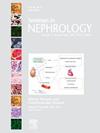求助PDF
{"title":"Using Predictive Models and AI for AKI Research.","authors":"Madhumitha Rajagopal, Lili Chan, Girish N Nadkarni","doi":"10.1016/j.semnephrol.2025.151673","DOIUrl":null,"url":null,"abstract":"<p><p>Acute kidney injury (AKI), a drop in kidney function with multiple etiologies, is a common complication in hospitalized patients and is associated with poorer patient outcomes. With the advent of electronic health records, machine learning algorithms have been developed that can predict the incidence and severity of AKI, AKI persistence, as well as patient outcomes like mortality and the need for kidney replacement therapies. Furthermore, it can risk-stratify patients based on early presentations to aid with clinical management. Newer technologies like natural language processing and generative artificial intelligence (AI) (e.g., ChatGPT) also show promise in the realm of AKI prediction and management. This review provides an overview of the role of AI in adults with AKI, as well as explores some limitations and ethical considerations that need to be addressed as we move forward. Semin Nephrol 36:x-xx © 20XX Elsevier Inc. All rights reserved.</p>","PeriodicalId":21756,"journal":{"name":"Seminars in nephrology","volume":" ","pages":"151673"},"PeriodicalIF":3.5000,"publicationDate":"2025-10-08","publicationTypes":"Journal Article","fieldsOfStudy":null,"isOpenAccess":false,"openAccessPdf":"","citationCount":"0","resultStr":null,"platform":"Semanticscholar","paperid":null,"PeriodicalName":"Seminars in nephrology","FirstCategoryId":"3","ListUrlMain":"https://doi.org/10.1016/j.semnephrol.2025.151673","RegionNum":3,"RegionCategory":"医学","ArticlePicture":[],"TitleCN":null,"AbstractTextCN":null,"PMCID":null,"EPubDate":"","PubModel":"","JCR":"Q2","JCRName":"UROLOGY & NEPHROLOGY","Score":null,"Total":0}
引用次数: 0
引用
批量引用
Abstract
Acute kidney injury (AKI), a drop in kidney function with multiple etiologies, is a common complication in hospitalized patients and is associated with poorer patient outcomes. With the advent of electronic health records, machine learning algorithms have been developed that can predict the incidence and severity of AKI, AKI persistence, as well as patient outcomes like mortality and the need for kidney replacement therapies. Furthermore, it can risk-stratify patients based on early presentations to aid with clinical management. Newer technologies like natural language processing and generative artificial intelligence (AI) (e.g., ChatGPT) also show promise in the realm of AKI prediction and management. This review provides an overview of the role of AI in adults with AKI, as well as explores some limitations and ethical considerations that need to be addressed as we move forward. Semin Nephrol 36:x-xx © 20XX Elsevier Inc. All rights reserved.
利用预测模型和人工智能进行AKI研究。
急性肾损伤(AKI)是一种多种病因导致的肾功能下降,是住院患者的常见并发症,并与较差的患者预后相关。随着电子健康记录的出现,机器学习算法已经被开发出来,可以预测AKI的发病率和严重程度,AKI的持久性,以及患者的结果,如死亡率和肾脏替代治疗的需求。此外,它可以根据早期表现对患者进行风险分层,以帮助临床管理。自然语言处理和生成式人工智能(AI)(如ChatGPT)等新技术在AKI预测和管理领域也显示出前景。这篇综述概述了人工智能在成人AKI中的作用,并探讨了在我们前进的过程中需要解决的一些限制和伦理问题。Semin Nephrol 36:x-xx©20XX Elsevier Inc.。版权所有。
本文章由计算机程序翻译,如有差异,请以英文原文为准。

 求助内容:
求助内容: 应助结果提醒方式:
应助结果提醒方式:


